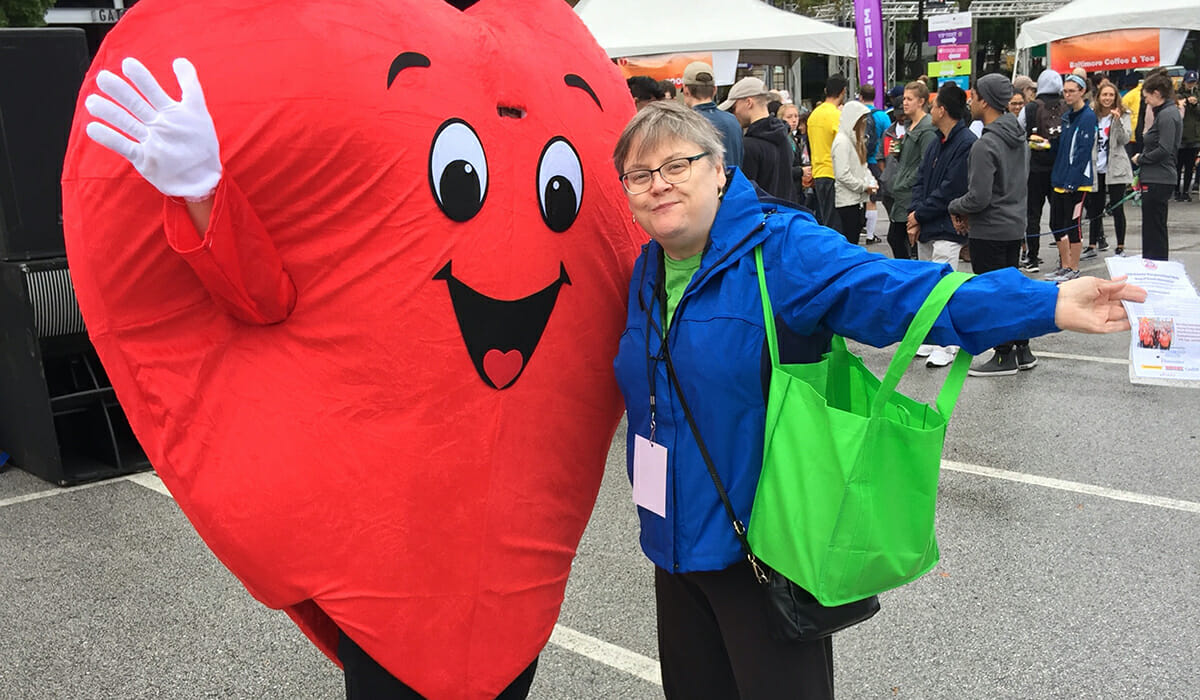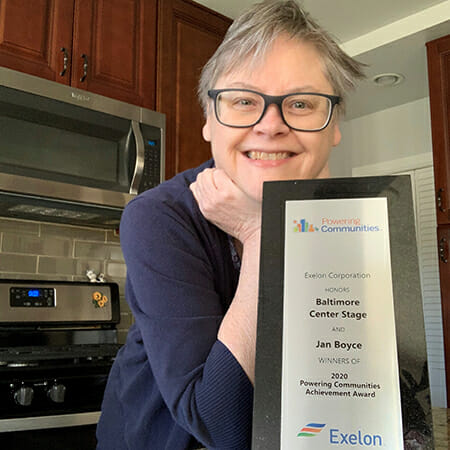Volunteer Dedicates Over Two Decades of Service to Baltimore Theater

Meet Daily Point of Light Award honoree Jan Boyce. Read her story and nominate an outstanding volunteer or family as a Point of Light.
For over two decades, Jan Boyce has helped spread Baltimore Center Stage’s message of diversity and inclusion throughout her community. Since 1997, she has served as a dedicated performance volunteer for Maryland’s state theater, with duties ranging from taking tickets, working as an usher, describing audio for the theater’s closed captioning, leading theater tours, training new volunteers, and helping cook for annual technical dinners. Jan has received multiple awards from Center Stage for the amount of volunteer hours she puts in, typically volunteering for three to four shows each season.
While the COVID-19 pandemic has put a pause on Baltimore Center Stage’s season, Jan has continued to find ways to volunteer by helping to distribute food from the Maryland Food Bank at the theater over the summer. In addition to her tireless effort to Baltimore Center Stage, Jan raises money for the American Heart Association and has participated in their annual Heart Walk for the past decade. She is also a member of the United Way of Central Maryland’s Tocqueville Society, donating $10,000 to the nonprofit each year as well as participating in their events.
Describe your volunteer role with Baltimore Center Stage.
I am a performance volunteer which means I help patrons. I might take your ticket, I might lead you to your seat, I might be at the audio describe. We do closed captioning at Center Stage now, so I actually run the scripts from the back of the theater for people who may have hearing issues or just need the addition of being able to see the words that the actors are saying. That’s done live. I’m also a docent. A docent basically is responsible to be an ambassador to Center Stage. We give tours. They’re free. I’ll take you into the scene shop, I’ll take you to the costume shop, I’ll explain the history of Center Stage to the patrons who are interested and walk them around. Also, Center Stage does what’s called a technical dinner for the actors and the crew. A technical dinner is done usually the Saturday or Sunday before the performance is going to start, which typically is on a Wednesday or a Thursday. Volunteers bring food. I’m typically the vegetable person, and that could be 50 people you’re cooking food for. The other thing I do is when new performance volunteers join Center Stage, I’ll help them get acclimated and learn the dos and don’ts.
What inspired you to first get involved with Baltimore Center Stage?
Back in 1997, I worked for BGE, which is a part of the Exelon companies now. They had a volunteer coordinator who sent out a message that Center Stage was looking for performance volunteers. I’ve always loved the theater. I have no talent when it comes to performing, but I really do love going to the theater, so I thought it was the perfect fit for me because I like people as well. I joined in the ’97-98 season. It became, I always say, a match made in heaven. I was the Rookie of the Year in that season. I worked I want to say close to 95 hours, and I joined halfway in season. I’ve been doing it for the last 22 years. … I get a lot of enjoyment from it.

What kind of role do you think Baltimore Center Stage has in your community?
Their mission is to bring diversity and inclusion to all. They are very much engaged in the community where the building resides, as well as bringing in new plays that are thought-provoking, plays or musicals or something that’s going to be different. When I first started, we had a director who made it her mission to always do at least two African-American plays within the season. It was required. She wanted to make sure everybody felt included. I love August Wilson. He is one of my favorite playwrights. He’s from Pittsburgh from a very predominantly African-American neighborhood, so he had a lot of relationships with Baltimore with it being a very African-centric city also. I got to meet August Wilson, and having opportunities to meet these actors and playwrights is just amazing.
Another thing they do is they have a fantastic education program. One thing I really missed doing this summer is a workshop where they have kids come in. There’s usually one workshop that will have an older set of kids, kids who are really interested in getting into theater eventually. There’s other workshops where they will have seven, eight, and nine-year-olds, and they actually put on a show at the end of their run with this workshop. It’s amazing what the people there do. I never realized, until I started working in a theater, that there are so many other opportunities in the theater. You don’t have to be a writer and you don’t have to be an actor. You can be a seamstress or you can build things. You can be an electrician. You can be all these different marvelous things within that group. They teach the kids different aspects of the theater. I’ve always found that their educational programs were just very inclusive and brought in people. These kids are marvelous. Kids who are shy and who may be afraid to step out of bounds, it opens up worlds for them. It’s amazing to watch these kids blossom and it’s a beautiful thing. I’m so glad that Center Stage does it. It’s part of their core mission to bring that diversity and inclusion into the community they serve.
What’s been the most rewarding part of your work?
I think knowing that I’m helping, whether it’s knowing I’m helping the Center Stage folks or I’m helping the patrons. On Wednesdays, we have a matinee, and that typically has a lot of clients who need more assistance than other clients. There’s three steps [in the theater], but three steps might not be the easiest thing for that person to get down. Just offering your arm so they feel a little secure when they’re walking down to get to wherever their seat is, is always a good feeling. I remember we had an emergency once when the plumbing decided to back up. The show went on, but at the end of the show, we had to get all the patrons out of the building without any instance. I was told I was the calm that kept everybody OK — ‘We’re just going to take this calmly, make sure you take this door, we want to make sure you don’t slip, don’t fall’ — make sure people were safe. I think I’m chosen a lot of times to do things when they know they need somebody who can be level set, who’s not going to be hyper or concerned. Because sometimes things do happen, and you just have to be able to be calm in your reaction to whatever is happening around you.
Why do you think it’s important for others to give back?
I think it’s important because it makes you feel good. That’s what I get out of doing it. I get the extra bonus because I love theater and I get to see the shows, but I think partly for me, it enriches my life being able to give back. Helping people experience the magic of theater is a wonderful thing.
Why do you think theater is magical and important for a community to have as an outlet?
I always say theater can make you laugh, it can make you cry. It can show you something from a historical perspective you never even imagined. I remember we did one play and I could only see that play one time, it was just that emotional. It brings things to people that you may not have thought. I can’t know what the experienced of being an African American is, but I can live that experience through the theater. I’ve never lived in a man’s shoes, but I can experience something through someone else’s eyes through the theater. I think theater brings you aspects of life that you may not have experienced directly, but it gives you that sense of who other people can be and are.
Can you describe the other ways you volunteer?
I volunteer with the American Heart Association. Every year I’m one of their leading individual donors as well as a money raiser. I walk [in their annual Heart Walk]. This year it had to be a virtual walk, of course. I’ve been doing that for about 10 years.
I’m also a Tocqueville member of the Untied Way, which means that I donate about $10,000 dollars every year to go to help people who need assistance. United Way of Central Maryland does such marvelous and wonderful things. When people really need that extra help and sometimes people just don’t know how and where to get it, their 211 service they have here in Maryland is great because people can call up and find out, ‘Who can I go to for this help?’ They really do help their people. I think it’s good for brotherhood or sisterhood. We have to take care of each other. That’s important to me, that we all take care of each other.
What do you want people to learn from your story?
I think giving back is important. I don’t talk about it a lot. I don’t say “You have to volunteer and you have to do this and you have to do that,” but to me, giving back is important. It actually makes me feel more whole. Partly with this coronavirus, I feel like I’m missing out because I don’t have that contact with people that I would normally be having. It’s sad I’m not experiencing that right now. I think to me that’s what you really want to be able to do. It makes me feel like I’ve done something good in this world, and it enhances me as a person, I think.
Do you want to make a difference in your community like Jan? Find local volunteer opportunities.
